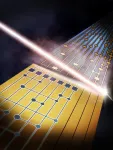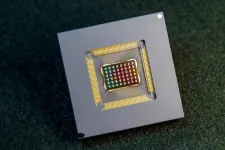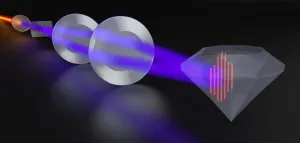(Press-News.org) Computers also make mistakes. These are usually suppressed by technical measures or detected and corrected during the calculation. In quantum computers, this involves some effort, as no copy can be made of an unknown quantum state. This means that the state cannot be saved multiple times during the calculation and an error cannot be detected by comparing these copies. Inspired by classical computer science, quantum physics has developed a different method in which the quantum information is distributed across several entangled quantum bits and stored redundantly in this way. How this is done is defined in so-called correction codes. In 2022, a team led by Thomas Monz from the Department of Experimental Physics at the University of Innsbruck and Markus Müller from the Department of Quantum Information at RWTH Aachen and the Peter Grünberg Institute at Forschungszentrum Jülich in Germany implemented a universal set of operations on fault-tolerant quantum bits, demonstrating how an algorithm can be programmed on a quantum computer so that errors can be corrected efficiently. However, different quantum error correction codes also come with different difficulties. A theorem states that no correction code can implement all the gate operations required for freely programmable computations with the logical quantum bits easily and protected against errors.
Quantum gates are realized with different correction codes
To circumvent this difficulty, Markus Müller's research group has established a method that allows the quantum computer to switch back and forth between two correction codes in an error-tolerant manner. “In this way, the quantum computer can switch to the second code whenever a logic gate that is difficult to realize appears in the first code. This makes it easier to implement all the gates required for computing,” explains Friederike Butt, a doctoral student in Markus Müller's research group. She developed the quantum circuits on which the experiment is based and implemented them in close collaboration with Thomas Monz's research group in Innsbruck. “Together, we have succeeded for the first time in realizing a universal set of quantum gates on an ion trap quantum computer using two combined quantum error correction codes,” says PhD student Ivan Pogorelov from the Innsbruck research group.
“This result is based on our many years of good collaboration with Markus Müller's team,” says Thomas Monz, who knows the theoretical physicist from his doctoral studies at the University of Innsbruck.
The findings of the current study were published in the journal Nature Physics. The research was financially supported among others by the Austrian Science Fund FWF, the Austrian Research Promotion Agency FFG, the German DFG, the Bavarian State Government, the European Union and the Federation of Austrian Industries Tyrol.
Publication: Experimental fault-tolerant code switching. Ivan Pogorelov, Friederike Butt, Lukas Postler, Christian D. Marciniak, Philipp Schindler, Markus Müller, and Thomas Monz. Nature Physics 2025. DOI: 10.1038/s41567-024-02727-2 [arXiv: 2403.13732]
END
Calculating error-free more easily with two codes
Quantum computer efficiently suppresses errors with two different error correction codes
2025-01-24
ELSE PRESS RELEASES FROM THIS DATE:
Dissolving clusters of cancer cells to prevent metastases
2025-01-24
Certain tumour types do not remain at their point of origin but spread throughout the body and form metastases. This is because the primary tumour continuously releases cancer cells into the blood. These circulating tumour cells (CTCs) can join together into small clusters of up to a dozen cells and settle in other organs. There, the clusters grow into larger tumours, known as metastases. Metastatic tumours are still a major medical problem: every year, around seven million people worldwide die from them.
One example of such a spreading tumour is breast cancer. As soon ...
A therapeutic HPV vaccine could eliminate precancerous cervical lesions
2025-01-24
PHILADELPHIA – A therapeutic vaccine targeting human papillomavirus type 16 (HPV16) induced regression in high-grade precancerous cervical lesions, according to the results from a phase II clinical trial published in Clinical Cancer Research, a journal of the American Association for Cancer Research.
“Nearly all premalignant cervical lesions and cervical cancers are caused by HPV infection, with HPV16 implicated in the majority of cases,” said Refika Yigit, MD, principal investigator and oncological gynecologist at University Medical Centre Groningen in the ...
Myth busted: Healthy habits take longer than 21 days to set in
2025-01-24
We’re nearly one month into 2025, but if you’re struggling to hold onto your New Year’s resolution, stay strong, as University of South Australia research shows that forming a healthy habit can take longer than you expect.
In the first systematic review of its kind, UniSA researchers found that new habits can begin forming within about two months (median of 59–66 days) but can take up to 335 days to establish.
It’s an important finding that could inform health interventions to ...
Development of next-generation one-component epoxy with high-temperature stability and flame retardancy
2025-01-24
Two-component epoxies, which require mixing resin and curing agent before use, often suffer from issues such as mixing ratio errors, limited working times, and inconsistent curing. Additionally, they must be used immediately after mixing, leading to wasted residue. To address these challenges, one-component epoxies have gained attention. One-component epoxies come pre-mixed, making them easy to use, reducing processing time, and ensuring consistent quality without mixing. In particular, using latent curing agents allows curing to be triggered only under specific conditions (e.g., heat or UV exposure), significantly improving storage stability. However, ...
Scaling up neuromorphic computing for more efficient and effective AI everywhere and anytime
2025-01-24
Neuromorphic computing—a field that applies principles of neuroscience to computing systems to mimic the brain’s function and structure—needs to scale up if it is to effectively compete with current computing methods. In a review published Jan. 22 in the journal Nature, 23 researchers, including two from the University of California San Diego, present a detailed roadmap of what needs to happen to reach that goal. The article offers a new and practical perspective toward approaching the cognitive capacity of the human brain with comparable form factor and power consumption.
“We ...
Make it worth Weyl: engineering the first semimetallic Weyl quantum crystal
2025-01-24
An international team of researchers led by the Strong Correlation Quantum Transport Laboratory of the RIKEN Center for Emergent Matter Science (CEMS) has demonstrated, in a world’s first, an ideal Weyl semimetal, marking a breakthrough in a decade-old problem of quantum materials.
Weyl fermions arise as collective quantum excitations of electrons in crystals. They are predicted to show exotic electromagnetic properties, attracting intense worldwide interest. However, despite the careful study of thousands of crystals, most ...
Exercise improves brain function, possibly reducing dementia risk
2025-01-24
A study led by scientists at Rutgers University-New Brunswick has shown that specialized cells involved in how the body responds to insulin are activated in the brain after exercise, suggesting that physical activity may directly improve brain function.
A study, published in Aging Cell, a journal focused on the biology of aging, indicates that therapies targeting this insulin action may be developed to offset or even prevent dementia progression.
“We believe this work is important because it suggests exercise may work to improve cognition and memory by improving the abilities of insulin to act on the brain,” ...
Diamonds are forever—But not in nanodevices
2025-01-24
Ultrawide-bandgap semiconductors—such as diamond—are promising for next-generation electronics due to a larger energy gap between the valence and conduction bands, allowing them to handle higher voltages, operate at higher frequencies, and provide greater efficiency compared to traditional materials like silicon. However, their unique properties make it challenging to probe and understand how charge and heat move on nanometer-to-micron scales. Visible light has a very limited ability to probe nanoscale properties, and moreover, it is not absorbed ...
School-based program for newcomer students boosts mental health, research shows
2025-01-24
The first randomized control trial of the school-based intervention called Supporting Transition Resilience of Newcomer Groups (STRONG) shows significant reductions in depression, anxiety and behavior problems among refugee and immigrant students. The study, funded by the National Institute of Mental Health, was co-led by Ann & Robert H. Lurie Children’s Hospital of Chicago and Loyola University, in partnership with the Chicago Public Schools (CPS). Results were published in the American Journal of Community Psychology. Key findings are summarized ...
Adding bridges to stabilize quantum networks
2025-01-24
While entangled photons hold incredible promise for quantum computing and communications, they have a major inherent disadvantage. After one use, they simply disappear.
In a new study, Northwestern University physicists propose a new strategy to maintain communications in a constantly changing, unpredictable quantum network. By rebuilding these disappearing connections, the researchers found the network eventually settles into a stable — albeit different — state.
The key resides in adding a sufficient number of connections to ensure the ...
LAST 30 PRESS RELEASES:
ASU researchers to lead AAAS panel on water insecurity in the United States
ASU professor Anne Stone to present at AAAS Conference in Phoenix on ancient origins of modern disease
Proposals for exploring viruses and skin as the next experimental quantum frontiers share US$30,000 science award
ASU researchers showcase scalable tech solutions for older adults living alone with cognitive decline at AAAS 2026
Scientists identify smooth regional trends in fruit fly survival strategies
Antipathy toward snakes? Your parents likely talked you into that at an early age
Sylvester Cancer Tip Sheet for Feb. 2026
Online exposure to medical misinformation concentrated among older adults
Telehealth improves access to genetic services for adult survivors of childhood cancers
Outdated mortality benchmarks risk missing early signs of famine and delay recognizing mass starvation
Newly discovered bacterium converts carbon dioxide into chemicals using electricity
Flipping and reversing mini-proteins could improve disease treatment
Scientists reveal major hidden source of atmospheric nitrogen pollution in fragile lake basin
Biochar emerges as a powerful tool for soil carbon neutrality and climate mitigation
Tiny cell messengers show big promise for safer protein and gene delivery
AMS releases statement regarding the decision to rescind EPA’s 2009 Endangerment Finding
Parents’ alcohol and drug use influences their children’s consumption, research shows
Modular assembly of chiral nitrogen-bridged rings achieved by palladium-catalyzed diastereoselective and enantioselective cascade cyclization reactions
Promoting civic engagement
AMS Science Preview: Hurricane slowdown, school snow days
Deforestation in the Amazon raises the surface temperature by 3 °C during the dry season
Model more accurately maps the impact of frost on corn crops
How did humans develop sharp vision? Lab-grown retinas show likely answer
Sour grapes? Taste, experience of sour foods depends on individual consumer
At AAAS, professor Krystal Tsosie argues the future of science must be Indigenous-led
From the lab to the living room: Decoding Parkinson’s patients movements in the real world
Research advances in porous materials, as highlighted in the 2025 Nobel Prize in Chemistry
Sally C. Morton, executive vice president of ASU Knowledge Enterprise, presents a bold and practical framework for moving research from discovery to real-world impact
Biochemical parameters in patients with diabetic nephropathy versus individuals with diabetes alone, non-diabetic nephropathy, and healthy controls
Muscular strength and mortality in women ages 63 to 99
[Press-News.org] Calculating error-free more easily with two codesQuantum computer efficiently suppresses errors with two different error correction codes



